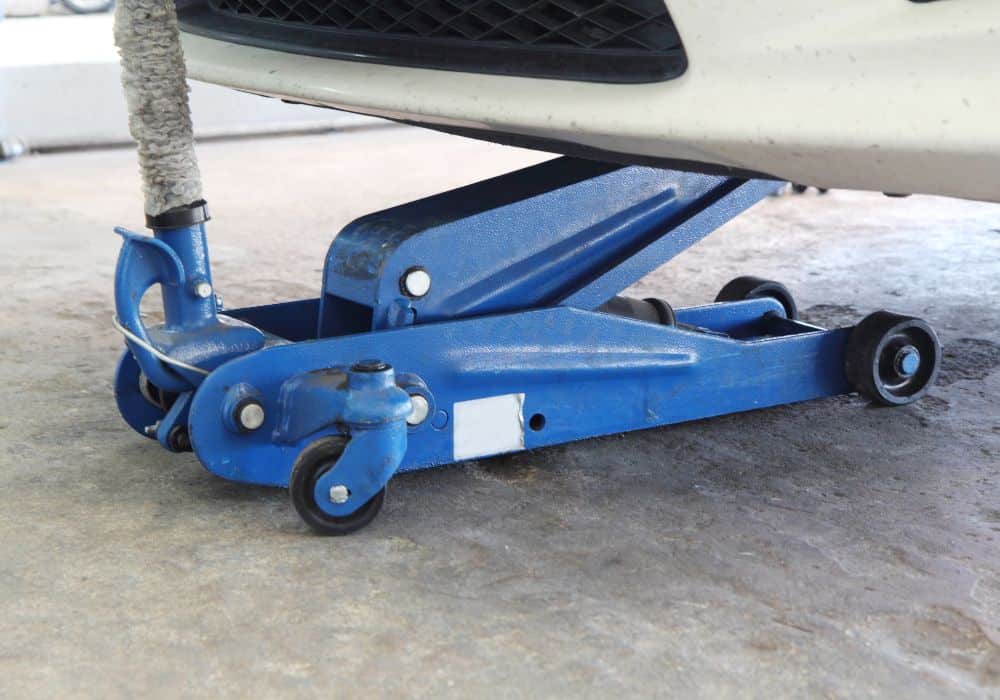Are you contemplating buying a new floor jack but unsure what to pick? With the help of our article, we will cover two of the most popular choices and compare them accordingly. So, here’s a detailed outline between aluminum vs steel floor jack, and learn more about this rather pivotal automotive tool.
Table of Contents
Main uses of floor jacks
When owning a car, there are times when you need to lift the vehicle off the ground, whether during repairs purposes or emergency purposes. Either way, the best tool to do this task is a floor jack. Floor jacks are actually one of the two main types of hydraulic jacks, the other is bottle jacks.
As a mechanical device, floor jacks have horizontal pistons and a long operating handle to easily hoist heavy loads up. Additionally, it comes with wheels that allow easy movement of the equipment according to your desired location. Other key features are the lifting control, saddle, and oil valve.
All these remarkable components provide solid support when carrying substantial load capacities, which is why floor jacks are more reliable than bottle jacks. Now, for the next section, it’s about choosing the best material for floor jacks.

A comparison between an aluminum floor jack and a steel floor jack
Floor jacks are typically made of either aluminum or steel and sometimes a combination of both. And if you’re to choose only one, then this is where your decision-making kicks in. To make the process easier, we will expound on the key features of each type according to a certain category.
1. Physical Dimensions
Let’s start the comparison with the physical attributes. Here, we will take into account the weight, the jack material, and other characteristics that make them unique.
Aluminum floor jack
Aluminum is actually one of the world’s lightest metals, making aluminum jacks very suitable for DIY works. Weighing at least 60 pounds, homeowners love the lightweight feature as they can handle work with ease. At present, most aluminum jacks come with a relatively flat surface and four wheels.
Likewise, this type of metal is known to be corrosion-resistant. So, if you want something that does not require the utmost maintenance, then this is a remarkable choice.
Steel floor jack
Steel jacks, on the other hand, are reputed for their strength and resistance to fracture, corrosion, and oxidation. Because of these, steel jacks weigh significantly more than alum aluminum jacks, roughly up to 100 pounds. To compensate for the weight, steel jacks come with wheels.
Unlike aluminum, steel can accumulate rust over time. Henceforth, this may be a downside of steel floor jacks, though even with the rust, the equipment still works remarkably.
2. Convenience and adaptability
The next category takes on the convenience of the users. Through this section, you’d be able to distinguish the most suitable option if you’re just a DIY person or a professional mechanic.
Aluminum floor jack
Since aluminum jacks are generally lightweight, this is the main reason why common people opt for this kind of floor jack. And of course, the four-wheel feature provides top-notch portability, allowing you to transfer the tool from one spot to another.
Apart from these advantages, this type of equipment is very easy to maneuver. The parts can be put into position seamlessly, adding up to their popularity. You won’t have to spend a long time preparing the tool. Plus, it takes pride in easy storage, whether in your garage or at the back of your truck.
Steel floor jack
Unlike aluminum jacks, steel jacks may be a challenge to maneuver because of their weight. Considering the composition of materials, it’s denser and heavier. It’s can be very large and bulky, which means it may take up plenty of space in the room.
Likewise, transporting the equipment poses additional stress to the users. Despite the cons, professional mechanics prefer this type due to its functionality, which is their biggest consideration. The weight of the steel makes it a more substantial tool when working on bigger vehicles and other materials.
3. Durability and stability
As mentioned above, many experts choose steel floor jacks because of their durability. However, the durability section goes beyond the weight of the material. There are other things to consider before you make your purchase.
In general, when a floor jack lifts a vehicle, it does not hoist up the entire weight. It only raises a fraction, typically one-third or half of the total weight.
But for stability purposes, it’s highly recommended to pick a jack that can keep up with the car’s weight. Let’s unravel this section further to understand the two types.
Aluminum floor jack
Aluminum floor jacks are very durable, though it loses the battle when we compared them with steel jacks. Still, it’s a good competition as these can commonly lift up to 3 tons, which is the best option for low-profile vehicles like a sedan and sports cars.
The 3-ton floor jack can also handle an SUV and even a lightweight truck. In addition, this type of metal can last for years, even with a certain level of wear and tear. It doesn’t easily acquire rust after sitting in the garage for quite some time.
Steel floor jack
When it comes to durability, steel floor jacks can withstand almost anything. The sturdy composition makes it difficult to cause dents to the equipment. And of course, the steel itself improves the stability and lift capacity of the equipment when lifting heavy cars.
This is the main reason why steel jacks are the most suggested choice if you’re handling vehicles that exceed 6000 pounds. It can seamlessly do the job because of its physical dimensions.
4. Price
Generally, floor jacks are a bit expensive compared to bottle jacks. But how about aluminum jacks and steel jacks? Which is cheaper? Either way, both are a great investment since these could last a lifetime with proper maintenance.

Aluminum floor jack
Now, the last area of focus is pricing. Aluminum jacks typically cost more per pound, although there could be compensation for this aspect. It’s because aluminum is much cheaper to shape than steel. Therefore, when it comes to production, aluminum floor jacks are slightly less expensive.
Steel floor jack
Compared to aluminum, steel is cheaper per pound. However, because of the process of creating a steel floor jack, this type of jack may be a bit pricier. Other materials incorporated to ensure its durabilities like bearing surfaces, screws, pins, fasteners, and overload valves should be factored in as well.
Even with the slight difference in the cost, it’s actually a fair deal, especially if you’re using the equipment for your work. It’s surely great equipment for professional mechanics.
The best floor jack goes to…
It’s a tie! Well, choosing the best aluminum floor jacks or steel floor jacks largely depends on your preferences. Therefore, you need to consider a lot of things, from the maximum weight to the lifting capacity and even its maneuverability.
You should also give serious thought to the design. There are several options in the market, including a low-profile design, hybrid-heavy duty variant, high-lifting capacity, and such. Thus, you must take your time before making your purchase.
If you’re unsure, you can always make your research and examine the key features of each product. Each manufacturer provides a detailed outline of their equipment so you can easily assess the best option for your needs.
A quick guide on how to use a floor jack
Whether you choose an aluminum jack or a steel jack, there are basic steps that you need to know beforehand when using a floor jack.
- Make sure that the vehicle is in Park mode and is on level ground.
- Block the wheels of the side where you’ll be lifting to provide extra stability.
- Locate the best jack points of your car. These are the strongest points that are designed for the jack to be in contact with. The underbody is typically the best section as well as the front area of the rear wheels.
- Position the jack on the fixed wheels and swivel casters. This is an important step for the easy maneuverability of the equipment.
- Roll the jack until you see the saddle stationed beneath the lift point.
- Pump the handle up and down. By then, you’ll see the cylinder hoisting up the lift arm.
- Stop pumping once the saddle comes into contact with the vehicle. During this step, you need to check the stability of the car. You may slightly move the jack, depending on the circumstance.
- With the vehicle being lifted, it’s time to do the work.
- Upon completion, you can now lift off the vehicle from the jack stands. Carefully remove and set aside the tool.
- Lower the vehicle slowly. This last step should be done with utmost care to avoid damage to the car’s suspension. Turn the handle counterclockwise or follow the instructions in the jack manual.
Conclusion
Both aluminum and steel floor jacks are very useful for car owners. Therefore, it’s best that you own at least one to save time and money from costly repairs that you can do on your own. So, go over the comparison above and pick the best equipment for your needs!
